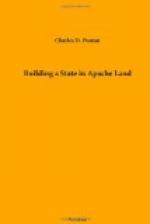At Tubac, the headquarters of the company, where the old Mexican cuartel furnished ample room for storage, about a hundred and fifty thousand dollars worth of merchandise, machinery and supplies were stored. The Apaches, to the number of nearly a hundred, surrounded the town and compelled its evacuation. The plunder and destruction of property was complete. We had scarcely a safe place to sleep, and nothing to sleep on but the ground.
The women and children were escorted to the old pueblo of Tucson, where the few people remaining in the Territory were concentrated; and they remained there in a miserable condition until the troops arrived from California under General James A. Carlton, United States Army, commonly called “Carlton’s Column.”
General Carlton, upon arriving in the Territory, issued an order declaring martial law between the Colorado and the Rio Grande. These troops garrisoned the country between the rivers, and drove out the rebel troops, who had come in from Texas under the Confederate government.
After the abandonment of the Territory by the United States troops armed Mexicans in considerable numbers crossed the boundary line, declaring that the American government was broken up, and they had come to take their country back again. Even the few Americans left in the country were not at peace among themselves,—the chances were that if you met in the road it was to draw arms, and declare whether you were for the North or the South.
The Mexicans at the mines assassinated all the white men there when they were asleep, looted the place, and fled across the boundary to Mexico. The smoke of burning wheat-fields could be seen up and down the Santa Cruz valley, where the troops were in retreat, destroying everything before and behind them. The government of the United States abandoned the first settlers of Arizona to the merciless Apaches. It was impossible to remain in the country and continue the business without animals for transportation, so there was nothing to be done but to pack our portable property on the few animals we kept in stables, and strike out across the deserts for California.
With only one companion, Professor Pumpelly, and a faithful negro and some friendly Indians for packers, we made the journey to Yuma by the fourth of July, where we first heard of the battle of Bull Run. Another journey took us across the Colorado Desert to Los Angeles, and thence we went by steamer to San Francisco, and thence via Panama to New York.
It was sad to leave the country that had cost so much money and blood in ruins, but it seemed to be inevitable. The plant of the Company at this time in machinery, materials, tools, provisions, animals, wagons, etc., amounted to considerably over a million dollars, but the greatest blow was the destruction of our hopes,—not so much of making money as of making a country. Of all the lonesome sounds that I remember (and it seems ludicrous now), most distinct is the crowing of cocks on the deserted ranches. The very chickens seemed to know that they were abandoned.




